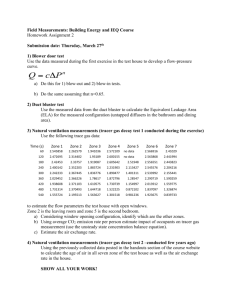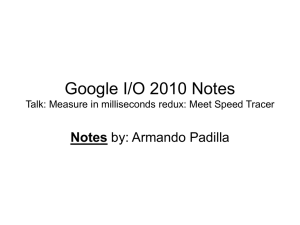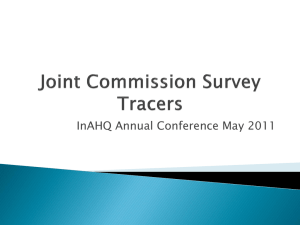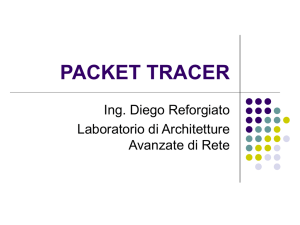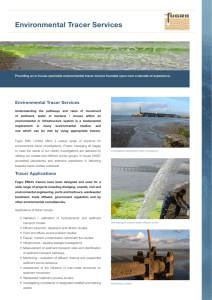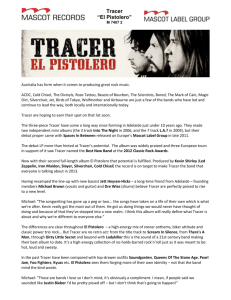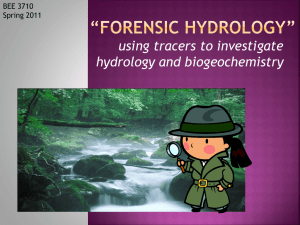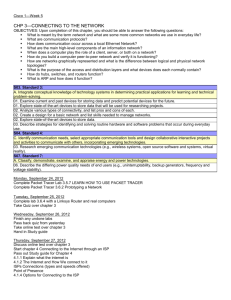UIOWA Chemical forecasts 2012-08-23
advertisement
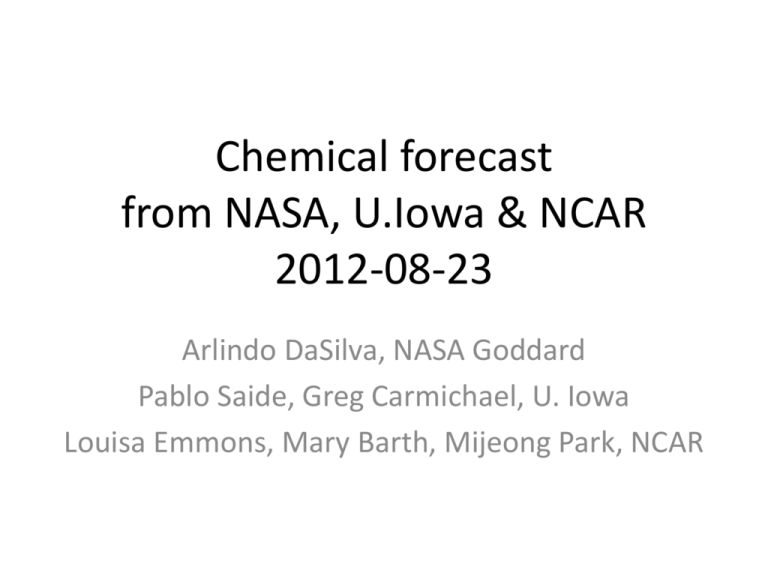
Chemical forecast from NASA, U.Iowa & NCAR 2012-08-23 Arlindo DaSilva, NASA Goddard Pablo Saide, Greg Carmichael, U. Iowa Louisa Emmons, Mary Barth, Mijeong Park, NCAR UIOWA model summary • WRFv3.3.1, 12km horizontal resolution, 35 vertical levels up to 50hPa, MYJ PBL, run continuously, FNL meteo, 2 runs: – Full chemistry: Lin MP, KF cumulus, CBMZ-MOSAIC 4 bin with aerosol direct effect, no biomass burning, MACC (assimilated, ECMWF) chemical boundary conditions • Output: Full chemistry (O3, CO, NOx, VOC, etc.), Aerosol mass (oc, bc, so4, nh4, no3, oin, na, cl, water) and number resolved by size – Tracer (no chemistry , no decay, no deposition), Morrison MP, Grell Cumulus • Tracers: Biomass burning (NCAR + Plume rise), Thailand, China region, India region, East Thailand region (Vietnam), West Thailand region (Nepal), South Thailand region (Indonesia), shipping, degassing volcanoes, dust, sea salt, MEGAN biogenics • Emissions: INTEX-B 2006 0.5°x0.5° resolution, IIASA 2005 1x1° shipping, vertical and diurnal variation for Area, Industry and Power. • Plots: Pressure levels: 925, 850, 500, 200, 150, 100. Five cross sections Topography, Cross-sections and model domain NCAR models: MOZART-4 and WRF-Tracer MOZART-4, driven by GEOS-5 meteorology (global) 1) Full Chemistry: 1.9°x2.5° horiz resolution 2) Tracers only: 0.5°x0.6° horiz resolution – Tracers with 25-day lifetime based on anthropogenic CO emissions (global and by region) and biomass burning – Soluble tracer with 25-day lifetime, global anthro CO emissions – 5-day tracer, global anthro CO emissions – Biogenic tracer, MEGAN isoprene emissions, 5-day lifetime – Lightning NO tracer, 5-day lifetime – Stratospheric ozone tracer • Emissions: Anthro: Streets-ARCTAS; Fires: FINN (Wiedinmyer) WRF with Tracers: 2 Domains: 20 & 4 km hor.resol.; top: 10 hPa Physics: – – – – – – Two moment cloud physics (modified Thompson et al., 2004) Tiedtke scheme / No convective parameterization Mellor-Yamada-Janjic PBL parameterization NOAH land surface model Rapid Radiative Transfer Model for long wave radiation Goddard scheme for short wave radiation Tracers: – 1 tracer from the boundary layer everywhere in domain – 2 tracers from the boundary layer for the Straits of Malacca region (passive and 1-day lifetime tracers) – 2 tracers from the mid-Troposphere region – 2 tracers from the Stratosphere region – 1 tracer from the production of lightning-NOx Other NCAR products FINN – Fire Inventory from NCAR (C. Wiedinmyer) Run in real-time using MODIS Rapid Response fire counts (FIRMS from UMd) Fire emissions for each fire, and gridded to 0.5 deg Emissions for CO2, CO, NO, BC, OC, etc., and speciated VOCs (MOZART, SAPRC, GEOS-chem mechanisms) MOPITT CO Processed daily at NCAR, available within 8 hours of overpass Joint Thermal/Near IR retrievals of CO profiles Global coverage in 3 days IASI CO Processed daily at NCAR Thermal IR retrievals Full global coverage twice a day 1. Anticyclone Transport • Good opportunities over Nepal • Big contributions from India and China regions China region contribution Total CO full chemistry 150mb India region contribution 1. Anticyclone Transport Lightning NO • Good opportunities over Nepal • Big contributions from India and China regions India Anthro (white line indicates source region) E.Asia Anthro 2. Pollution over Northern Bay of Bengal, Nepal Anthro CO • Iowa WRF has some transport from India over BoB, but MZ4/GEOS5 does not • Pollution over Nepal mainly from India, very mixed due to anticyclone India contribution 850 hPa Total CO full chemistry 850 hPa 3. Outflow from cumulus, cloud processing • Isolated convection over BoB and east of Singapore • Cumulus outflow from India, south Thailand, and Biomass burning India region contribution 150mb Vertical velocity Biomass Burning 150mb Indonesia region 150mb 3. Outflow from cumulus, cloud processing Lightning NO • Low values of soluble tracer indicate extensive cloud processing of air at 200 hPa Anthro, 25-day tracer Anthro, 25-day soluble tracer 3. Outflow from cumulus, cloud processing NCAR WRF-Tracer shows strongest convection over S. Gulf of Thailand Reflectivity (dBZ) 4. Tropospheric chemistry source characterization • All at 850 mb Dust tracer CO full chemistry (non BB) Volcano tracer Biogenics tracer Biomass burning tracer 4. Tropospheric chemistry source characterization • Anthro • Fires • Biogenics Isoprene emissions tracer Anthro tracer Fire tracer 5. Ship track study • Cross section west to east through Singapore (103.75E) • Sources other than shipping dominate pollution • Low clouds present Indonesia region Tracer Shipping Tracer Biomass Burning Tracer Volcano Tracer 6. TTL Cirrus heating rates • Cirrus over clear water on East BoB, east Philippines, around Java LWP Cloud Incidence IWP 7. Cirrus microphysics • Extensive cirrus coverage (model cloud fraction at 150mb) • High number of Aerosol Aerosol Number full chem Cloud Incidence Biomass Burning 150mb 8. Smoke radiative heating rates 13. Biomass burning BB across Singapore • Avoid convection close to Singapore CO BB 150 mb CO BB 850 mb 8. Smoke radiative heating rates 13. Biomass burning • Some burning on Borneo CO Biomass Burning 150 mb CO Biomass Burning 850 mb 10. Mixing into TTL • Tropopause height ~ 17km over Utapao (~100mb) • Big China Contribution Water vapor 100mb Tracer run Strat intrusion near convected pollution? China region 100mb Water vapor 100mb FullChem run 11. ACE satellite retrievals 12. Aerosol retrievals through clouds 14. CALIPSO and CloudSat retrievals • Aerosols and clouds LWP+IWP, LWP contours TOTAL AOD with contours at 500mb AOD with cloud contours Across Utapao
